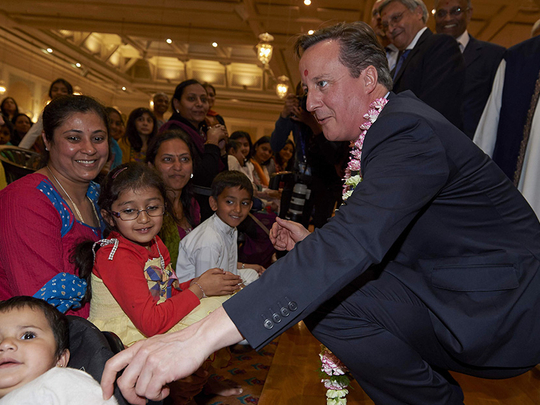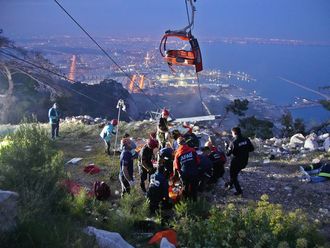
STRATFORD-UPON-AVON, UK: The greatest social achievement by former prime minister Margaret Thatcher was to turn Britain from a nation of shopkeepers into a nation of homeowners. And with fewer than a third of London’s 10 million residents able to afford their own home, getting young couples onto the home ownership ladder has become a political priority for both the Conservatives and Labour as Britons head to the polls on Thursday.
Doris and Tom Hornchurch from Wolverhampton in the British Midlands bought their council home under a purchase scheme brought into effect by Thatcher in the late 1970s.
“We were able to buy our home then for the princely sum of £4,000 [Dh22,240],” says Tom, a retired plumber who mostly did boilers. “Heating couplers and thermostats. They were always going. If I had a pound for every one of those I changed over forty years I’d be a wealthy man now.”
It’s the May bank holiday weekend. And Tom and Doris are doing what they do every long weekend — and for a month in the summer as well — towing their second home to the Gower Peninsula in South Wales.
Their second home is a caravan — and every long weekend on Britain’s crowded roads, caravans are a very common sight, pulled along the slow lanes of the motorways and ‘A’ roads by sturdy estate cars — or station wagons as the Americans call them.
As Gulf News speaks to the couple, they are relaxing on fold-down lawn chairs waiting for a little gas cooker to boil their kettle for a midmorning cup of tea on a layby at the side of a busy road through here, the birthplace of William Shakespeare.
“We always pull over here,” Doris says. “It’s one of our regular spots.” The next one will be on the Welsh side of the border, and then a couple more hours onto their camping spot near Tenby.
As the kettle comes to a boil, the talk turns to politics.
“I used to vote Labour when I was younger,” Tom says. “Once Maggie [Thatcher] allowed us to buy our home, I’ve voted Conservative. But this time I’m voting for Ukip.”
According to the latest opinion polls, the United Kingdom Independence Party is on track to receive 15 per cents of the votes. But because of the first-past-the-post electoral system where the candidate in each constituency receives the most votes, Ukip is unlikely to win more than 10 of the 650 seats in the House of Commons at Westminster. But with the election too close to call, those 10 seats will garner the interest of Conservative leader David Cameron in an effort to hammer out a centrist-right coalition government.
“I think we let too many foreigners in,” Tom says. “I couldn’t make a living now with all of the immigrants coming in and doing work cheaper — and not paying tax and claiming welfare benefits. We need to limit them and send them back,” he says.
Ukip remains firmly anti-immigrant and anti-European Union and believes that to make Great Britain ‘great’ again, it should shut its border to outside workers.
In an effort to siphon off support from Ukip, Cameron has pledged to hold an “in or out” referendum on the UK’s future in the EU.
“Yes,” Tom says. “We should have a vote and I’ll be voting to leave the EU. We don’t need Brussels telling us what to do. Next they’ll be telling us that we can’t stop at this layby to brew up a cuppa because it’s a health and safety issue. [Ukip leader] Nigel Farage has my vote.”












